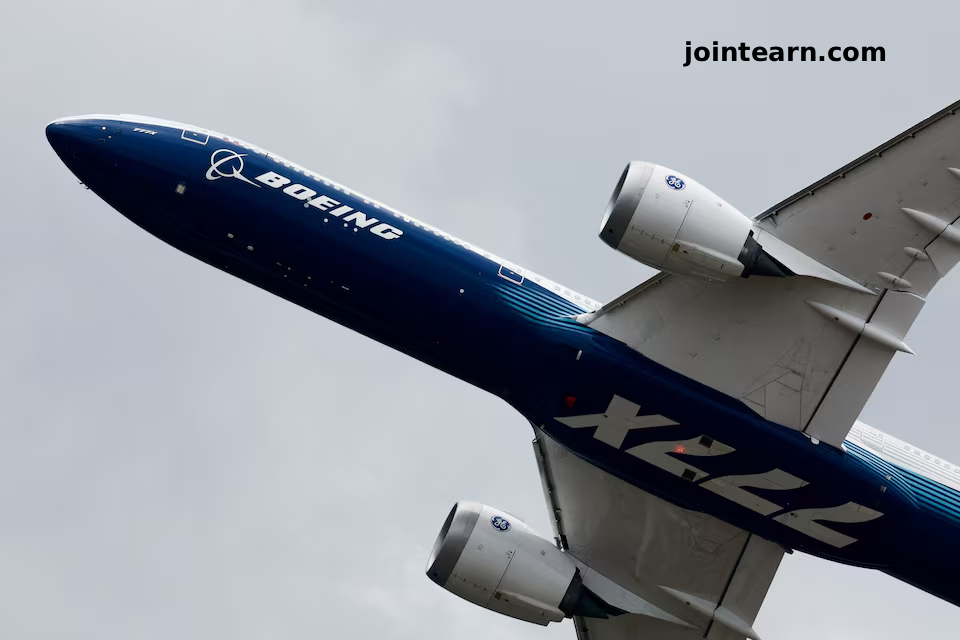
Boeing Co. (NYSE: BA) announced on Wednesday that it will take a nearly $5 billion charge related to ongoing delays in its 777X aircraft program, marking yet another setback for the U.S. aerospace giant as it works to stabilize production and restore investor confidence.
The company confirmed that the first delivery of the 777X widebody jet has now been pushed to early 2027, extending the timeline beyond the previously planned 2026 launch and underscoring persistent certification and production challenges.
A Decade-Long Journey Faces More Turbulence
The Boeing 777X, launched in 2013, was originally scheduled for delivery in 2020 and was expected to set a new benchmark for long-range, fuel-efficient air travel. The aircraft — the latest and largest variant of Boeing’s successful 777 family — has faced a string of delays due to certification hurdles, production setbacks, and shifting market demand in the wake of the COVID-19 pandemic.
Boeing executives had hoped the program would help reassert the company’s dominance in the widebody jet market, where rival Airbus SE (AIR.PA) has gained ground with its A350 series.
“There is still a mountain of work to be done,” CEO Kelly Ortberg said last month, referring to the certification process. He emphasized that no new technical issues had been identified, but acknowledged the company remained behind schedule.
Financial Impact and Production Challenges
The nearly $5 billion accounting charge highlights Boeing’s struggle to keep costs under control amid prolonged development timelines. The setback adds pressure on the company’s efforts to improve cash flow and profitability, especially as it works to recover from years of turbulence tied to the 737 MAX crisis and ongoing supply chain disruptions.
While the 777X program remains years away from generating revenue, Boeing’s narrowbody jet division has shown signs of improvement. The company recently secured approval from the U.S. Federal Aviation Administration (FAA) to boost production of the 737 MAX from 38 to 42 aircraft per month, a positive milestone after regulatory restrictions were imposed following a mid-air panel incident in early 2024.
Delivery Performance Rebounds
Boeing delivered 55 aircraft in September 2025, its best monthly performance since 2018, and a sharp rise from 33 deliveries in the same month last year when a strike by 33,000 factory workers in the Pacific Northwest disrupted operations.
For the first nine months of 2025, Boeing delivered 440 aircraft, compared to 291 during the same period in 2024 — a 51% increase that signals progress toward recovery despite lingering production challenges.
Deliveries are a critical metric for Wall Street analysts and investors, as Boeing and rival Airbus receive the bulk of aircraft payments upon delivery. Higher delivery volumes typically translate into improved cash flow and revenue performance, which are especially vital for Boeing as it manages debt accumulated during the pandemic.
777X: A Critical Program Under Pressure
The 777X, also known as the 777-9, is designed to be the world’s largest and most efficient twin-engine jet, featuring new composite wings, advanced GE9X engines, and improved aerodynamics. It has garnered significant orders from airlines such as Emirates, Lufthansa, and Qatar Airways, though many carriers have sought revised delivery schedules amid delays.
Industry analysts note that each new postponement risks eroding confidence among customers and investors who have already endured a decade-long wait for the aircraft’s entry into service.
“For Boeing, the 777X is not just another program — it’s a credibility test,” said one aerospace analyst. “Delays add cost pressure, but more importantly, they affect relationships with key airline customers.”
Outlook: Balancing Recovery and Risk
Despite the setback, Boeing remains optimistic about long-term demand for the 777X and its broader commercial aircraft portfolio. The company continues to see robust interest in fuel-efficient jets as airlines modernize fleets and aim to meet sustainability targets by the early 2030s.
With global passenger traffic nearing pre-pandemic levels and cargo operations remaining steady, Boeing expects the next two years to be pivotal in regaining production stability and improving margins.
However, analysts warn that the company must navigate rising costs, tight supply chains, and lingering regulatory scrutiny — all while delivering on its ambitious recovery roadmap.


Leave a Reply